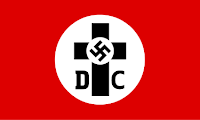"As in German Protestantism generally, so also in Hamburg [the] political 'rebirth' of Germany and [the] religious as well as moral 'renewal of the German people' circulated 'as diffuse rallying cries [(Reizworte)] and allowed the current situation of the church to appear as a kind of Babylonian Exile' (Kurt Nowak). Thinking and feeling mostly as German nationalists, persevering in fear of [a] Bolshevism inimical to Christianity [(kirchenfeindlichen)], and giving credence to the NSDAP’s affirmations of 'positive Christianity,' an overwhelming majority of Protestants saw in the 'national outbreak [(Aufbruch)]' of Hitler’s cabinet a signal that a powerful national politics—the re-Christianization of society and the moral elevation associated therewith—[had] again now made an appearance in Germany. Community spirit, clear political leadership, and the Christianization of society constituted, so Kurt Nowak, an intersection between what National Socialism promised and what those in the church wished for. The affinity of the Protestant milieu for the NSDAP was therefore [an] expression of the problematic faith [that] the aporias of modern political and social organization could be overcome by the production of 'unequivocality [(Eindeutigkeit)' in a ‘community of the people [(Volksgemeinschaft)].''"
Erik Eichholz, "Gefangenenseelsorge
und nationalsozialistischer 'Strafernst':
zur Politik der hamburgischen Landeskirche in der Gefangenenfrage," Kirchliche
Zeitgeschichte 12, no. 1 (1999): 173-174 (172-188). A specialist could tell right away by the way I've translated these catchphrases that I have done very little reading in this area!


No comments:
Post a Comment